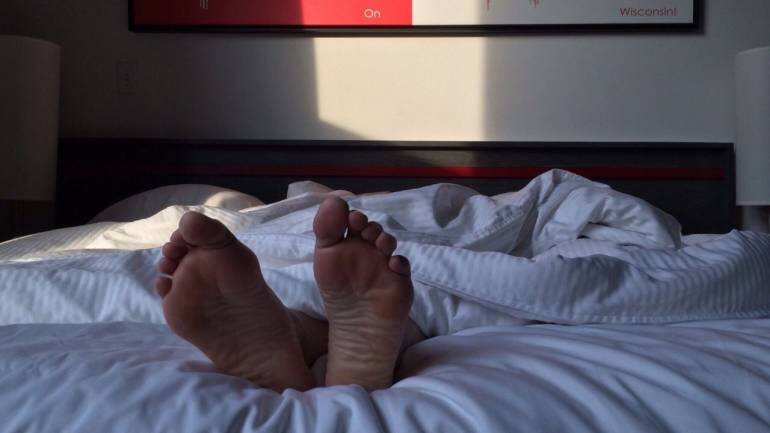Poor sleep quality: Weight gain, high blood pressure and memory loss are warning signs
How to sleep better: Lack of sleep causes a host of problems in your body that could lead to bigger issues like heart problems and other complications. Follow these simple tricks to stay healthy
1/9

According to experts, it is essential that you should give yourself at least 7 to 8 hours of sleep each night to stay healthy. If you clock in anything less than this, you are exposing yourself to problems such as forgetfulness, mood swings and even depression. Sleep deprivation makes a person increasingly irritable, emotional, and inattentive. After not sleeping for three days or more, you may start to hallucinate and eventually become delirious. Hence it is important to address the warning signs as early as you can. (Image: Pixabay)
2/9

According to experts, trouble sleeping may occur due to a number of reasons like insomnia, sleep apnea, narcolepsy, jet lag, restless legs syndrome and even ageing. Sleep deprivation is most commonly seen among people with depression, schizophrenia, chronic pain syndrome, cancer, stroke, and Alzheimer's disease, says Dr. Jaya Sukul Clinical Psychologist, Marengo Asia Hospital, Faridabad. She adds that If sleep problems/disorders are left unattended, it could lead to weight gain, impaired job performance, memory problems, and high blood pressure that may also give rise to cardiovascular problems. (Image: Pixabay)
3/9

It's important to understand that insomnia is a symptom of an underlying problem and it may include physical or mental health issues, lifestyle habits, or stress. (Image: Pixabay)
4/9

Extended periods of poor sleep can lead to many serious physical, psychological, and emotional tolls, says Mansi Gulati, International face yoga expert. "If you deprive yourself of sleep, your body’s immune system cannot function at its best. Lack of sleep is a stressor to the body, and the body’s reaction to this stress is similar to its response to low-grade inflammation. Common wisdom has it that when you feel sick, you should take to your bed. In fact, the release of special immune-system proteins called cytokines — part of the body’s reaction to infection — makes you sleepy. So bed rest is often just what the doctor's suggest universally," she adds. (Image: Pixabay)
5/9

Dr Jaya Sukul suggests opting for a soft and supportive cushion. "It is critical to be comfortable with your pillow. The pillow gives support to your head, neck, ear, and shoulder too. A comfortable pillow may help you fall asleep sooner and sleep better," she says. (Image: Pixabay)
6/9

Refrain from having coffee before going to bed, says Dr Sukul. "It may lead to insomnia or interrupt your sleep pattern. Having a cup of coffee before bedtime is not good as coffee contains caffeine which may ward off your body from naturally resting at night and keeps you active," she says, adding, "Also reduce your daytime naps as short naps during the day may make it hard to sleep at night. Stick to a consistent sleep schedule at night." (Image: Pixabay)
7/9

Aromatherapy, Dr Sukul suggests, is very helpful to fight sleeplessness. "You can use essential oils like lavender and chamomile to relieve stress and treat insomnia. Even taking a hot shower just before going to bed helps boost the sleep quality," she says. (Image: Pixabay)
8/9

Meditation, controlled breathing, muscle-relaxing activities, stretching, and other relaxation techniques, too, are very beneficial, says Dr Sukul. "All of these help you relax and fall asleep again if you wake up in the middle of the night. Avoid eating late at night. It is best to eat your meal 2-3 hours before going to bed. It will give your body enough time to digest the food. Refrain from having heavy meals and too many fluids late at night," she adds. (Image: Pixabay)
9/9

"Avoid foods like refined carbohydrates, white flour, refined sugar or packaged foods as these could cause an imbalance in your sugar leading to night-time snacking. You may have more fiber and foods high in protein. Drink plenty of water throughout the day to keep the feeling hungry in check at night," says Dr Sukul, adding, "Make sure your bedroom is all set for a good night’s sleep. Keep your bedroom quiet, dark, and cool. You could read a book or listen to soothing music to unwind and turn off screens at least one hour before bedtime." (Image: Pixabay)
Discover the latest Business News, Budget 2025 News, Sensex, and Nifty updates. Obtain Personal Finance insights, tax queries, and expert opinions on Moneycontrol or download the Moneycontrol App to stay updated!






